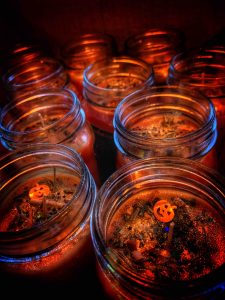The Rise of Celtic Rituals in the 21st Century: Lessons for Cornish Heritage
Categories Folklore, Myths & Legends2 Comments
From Beltane bonfires to Samhain dancing, there has been a resurgence in traditional Celtic rituals across both Cornwall and the western world. Perform a quick Instagram search for the Celtic holiday of #Imbolc and you will come across almost 100,000 photos including candle-adorned altars, floral offerings and old-fashioned herbal tinctures. It is not just seasonal ritual that is capturing the imagination. There has also been an increase in the number of people planning their lives around the moon. Much like Cornwall’s ancient Druids, they gather under the lunar light during a full or new moon. These small groups, known as Moon Circles, provide a safe, sacred space to heal, reflect and engage in rituals –including burning incense, ‘smudging’, charging crystals and using a ceremonial altar.
 Fun Samhain Ritual Candle
Fun Samhain Ritual Candle
There has been a rise in the popularity of astrology too – although unlike the Druids, 21st century astrologers are looking to mobile-phone apps for guidance, instead of the trees. The artificial intelligence-drive app, Co-Star, offers hyper-personalised, time-real horoscopes based on NASA data – and it’s been downloaded over 3 million times in the last two years alone. Across Cornwall, you will find spiritual healers offering chances to meet ancestral spirit guides; wise women brewing herbal medicines and witches purveying DIY spell kits. Just like their Celtic ancestors, these folk are seeking meaning from their natural surroundings –whether it’s organic potion-making or outdoor ceremonies. Instagram and Facebook are home to micro-businesses selling metaphysical goods – such as ritual candles, sacred herbs and oil blends. There are magick-themed subscription boxes that promise to bring abundance and joy to your living room. Social media has brought this trend to the fore with an impeccably curated array of ritual observing, from old pagan holidays to full moons.
So why are so many young, creative, politically engaged people embracing magical practices?
In an age of 24 hour news, pandemic and allegations of police brutality, logging off and reconnecting with Mother Earth holds a distinct appeal. This means many people – including younger generations – are putting their phones down and turning to nature and spirituality to feel more grounded.
Previously, people turned to religion in uncertain times so they could make sense of the world around them. However, traditional western religion has declined in popularity with surveys consistently showing fewer people than ever describing themselves as religiously affiliated.
For many, mysticism and magic are stepping in to fill this void. They read witch-themed self-help books and join solstice celebrations at Cornwall’s ancient sites, including Madron Well. Some people leave seasonal offerings to mythical Celtic goddesses or consult tarot cards. During an era characterised by uncertainty, this movement promotes love, connection and respect for the natural world – as well as care for all living things. This appeals to people from all walks of life by transcending social class and traditional political divides.
The last few years have brought an increase in populism – including the election of controversial characters, such as Donald Trump and Boris Johnson. Global capitalism means that many cannot buy a local home or even pay rising rents – so it’s hardly surprising that people seek a temporary escape to a more magical world. Zero-hours contracts, the gig-economy and student loan-debt all mean that younger people seek an escapism they can afford – whether it is avocado toast or an equinox ritual.
There has also been a move towards a pick-and-mix approach to spirituality. Rather than converting to one pre-defined religion or set of beliefs, people are choosing spiritual ideas and practices from any source that works – from Paganism to Zen Buddhism and Christianity. This forms part of a wider trend among younger people, where they are more likely to regard themselves as ‘spiritual, but not religious’.
Return to the Temple of Instagram and it’s easy to see how these mystical practices hold such appeal. You’ll discover toned well being practitioners running guided movement classes, while subtly selling essential oils, dried flowers and more to unwitting consumers – as well as Insta-gurus, such as the Hood Witch, with her 467k followers and spiritual sound bites.
As advocates for Cornish heritage, what can we learn from this trend?
Paganism once carried negative connotations amongst young people. Previously associated with middle-aged men in decidedly ‘uncool’ robes, it now appeals to the younger generation’s liberal, earthy values. Similarly, crystal healing was once the preserve of old, fusty hippies –but nowadays teens match their nail polish to their rose quartz and amethyst stones, before using them to banish negative energy.
 Witchy Insta Image
Witchy Insta Image
We need to embrace modern tools – such as Instagram and Facebook to make Cornish heritage more appealing to younger generations. Practitioners should create simplified versions of our history, condensed to a few sentences at most. It’s often argued that we live in an era defined by populism and sound bites – and this means we need to evolve in order to effectively engage people with their past.
Whether it is black and white fingernails on St Piran’s Day, Celtic yoga classes or Druid style moon ceremonies, we can use these passing trends as a bridge to exploring the Duchy’s history and culture. There are some truly magical Cornish stories, from Tristan and Iseult to the Mermaid of Zennor. If used effectively, they provide a refreshing means for people to transcend the traumas and challenges of contemporary life.
There is absolutely nothing stopping the Cornish language, traditional recipes or the Duchy’s inspiring history from being the next big thing amongst younger people. We simply need to consider how to present these facets of Cornish identity in an accessible, appealing and relevant way.
Rebecca Tidy
Rebecca Tidy is a freelance writer and researcher. She teaches yin yoga and Pilates in her spare time. She has a PhD in Political Science from the University of Exeter.

I have seen a rise in Handfastings ceremonies
Thank you for that information David. We are interested in exploring different aspects of Celtic Spirituality that can be explored in a future series. CS